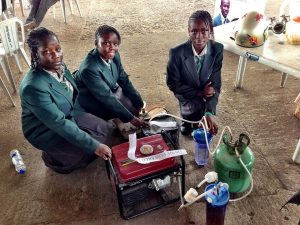A young Nigerian boy remains a stoic to the Biblical allusion “Whatever your hand finds to do, do it with all your might…” as he uses carton scraps to fabricate a generator.
Ernest Collins, a 13-year-old boy from Ekwuolobia Umuochuba, Aguata local government area of Anambra state has employed engineering virtuosity in fabricating a generator to power his mini house.
The Junior Secondary School (JSS3) student has also utilised his skills to construct several houses with cartons and other common raw materials.
Ernest Stanley, a Facebook user, who shared the story on his page, revealed that Collins used the newly assembled generator to power his house.
Stanley said in the Facebook: “Collins has built some houses and constructed the generator this January that can even power the house and a light bulb.”
However, four Nigerian high school students fabricated a generator that produces electricity for six hours using a single litre of urine as fuel in 2012.
The quartets were Duro-Aina Adebola, Akindele Abiola, and Faleke Oluwatoyin, all aged 14, and Bello Eniola, 15 then.

The girls showcased a thoughtful and practical innovation that warmed the heart of Africans and the international community. This invention was a urine-powered generator which could provide safer, affordable and more access to electricity supply.
The invention, which was first showcased at the Maker Faire Africa annual pan-African conference, was hatched by the girls in their school chemistry laboratory and could use one litre of urine to supply a six-hour electricity.
Furthermore, these young inventors said the system separates urine into nitrogen, water and hydrogen. Urine is put into an electrolytic cell, which separates hydrogen. The hydrogen goes into water filter for purification, which then is pushed into the gas cylinder. The gas cylinder pushes hydrogen into a cylinder of liquid borax, which is used to remove the moisture from the hydrogen gas. This purified hydrogen gas flushes into the generator.
Some Akwa Ibom people, who spoke with StraightNews blamed the impediments of technological inventions on government, unfriendly environment and archaic culture, among others.
Edikan Robert Ekpo identified lack of political will, unstable electricity supply, ill-equipped science laboratories, lack of research centres and systemic corruption as impediments to inventions in the country.
Ekpo, an electrical engieneer, said “I want federal government to provide an enabling environment for the emergence of young inventors. Again, most people in our society particularly youths participate in active politics as a short to wealth creation by neglecting other skillful professions and entrepreneurships. I want our young men to develop themselves in meaningful professions as a way of arousing their ingenuity. Money meant for research should be spent on it rather some people embezzling it.”
Emmanuel Ndaeyo identified unfavourable government policies, brain drain, unfriendly environment, ethnicity and inefficient political culture that stifle creativity as part of the impediments to technological advancement in the country.”
Ndaeyo, who is a legal practitioner, enjoined “I want government to financially and otherwise support creative minds to turn things round. Let government create an enabling environment to allow experienced hands to come in and groom the young minds.”
But to Michael Utuk, a sociologist, cultural base of Nigerians stifles the spirit of invention. “Our cultural belief impedes our effort in invention. What the blacks see as devilish, turn and run away is what challenges the whites to explore for achievement. Cultural belief does not inhibit the whites from pushing for invention.”
“I want the blacks to dispel their cultural fears and push forward for invention. Again, I want us to emulate the whites in thinking beyond our immediate environment and to put in stir our technological drive,” Etuk opined.
Nigeria has great potentials particularly human manpower that can turn things around. Some Nigerians are truly talented. Others endowed with great skills are found in the country while the rest are finding their greener pastures in foreign countries.
Yet, has the Nigerian government encouraged these teenage inventors by giving them scholarships to further improve on their knowledge? Has Federal Ministry of Science and Technology appropriated in their yearly budgets for the mass production of these generators? Where are these teenagers? Or, have they faded into the crowd of “has-beens”?
Before now, some Nigerians even teenagers had invented more without getting patent rights from governments and endorsements by multinationals. Since they were not encouraged, a new generation of inventors is in a dilemma. “Will government assist us to improve our creativity and further our talent?” is the question on their lips. “Is there hope for Nigeria’s technological development? Is there a future for the country’s technological breakthroughs? Or, is Nigeria comfortable with being branded a consumer nation?” they prodded, yet no answer.
Some lesser countries in Asia even in Africa that were crawling when Nigeria was regared as ‘the giant of Africa’ are far ahead of the ‘giant’. Who will redeem the country from this technological morass?
